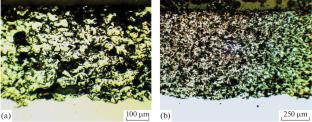Structure and Tribological Properties of a Ti–TiN Coating Obtained by Hypersonic Metallization
Abstract—
The structure and properties of a hypersonic coating from a Ti–4Al titanium alloy obtained at various propane pressures have been investigated. It is shown that the sprayed coatings contain from a 50 to 70 vol % TiN phase. It was found that the volume fraction of the nitride layer on the surface of a titanium particle depends on the area of titanium particles and their flight speed during deposition. It is shown that the microhardness of the deposited layers of coatings is 1200–1600 HV 0.025 and the hardness of the coatings is 450–650 HV 10. The difference in hardness and microhardness values is associated with the presence of pure titanium interlayers in the coatings, as well as with high porosity. It has been established that hypersonic coatings made of Ti–4Al alloy are characterized by high wear resistance under dry and boundary friction conditions. In particular, under conditions of dry friction, the wear resistance of coatings is ≈14–16 times higher than the wear resistance of a specimen made of Grade 2 monolithic alloy, and under friction conditions in a lubricant up to ≈240 times. Sputtered coatings of titanium alloys containing the TiN nitride phase can be used as protective and wear-resistant layers on the surfaces of various materials, including titanium. It is concluded that the hypersonic metallization method makes it possible to form economical nitride-based coatings characterized by high microhardness and wear resistance.


 求助内容:
求助内容: 应助结果提醒方式:
应助结果提醒方式:


